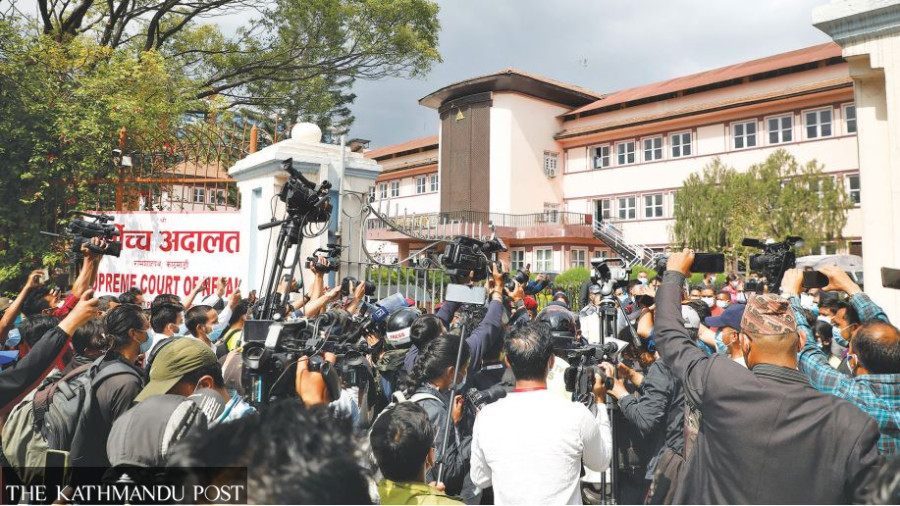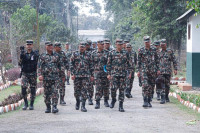National
As key institutions fail to perform, regressive agenda at play
The more democratic institutions weaken, the powerful the right wing forces become, experts say.
Binod Ghimire
The federal parliament prorogued on Friday without endorsing any bills other than those related to the annual budget. The 13 meetings in the around two months-long session were largely unproductive with the main opposition CPN-UML resorting to continued obstruction. Neither the government nor the Speaker took any concrete measures to break the deadlock.
Not just the recent session but the preceding two sessions were also prorogued without endorsing any crucial bills. Some of the bills are pending since the first session in 2018. The KP Sharma Oli government, in its attempt to prove the House irrelevant, didn’t provide it any bills making it fully defunct. The incumbent Sher Bahadur Deuba government was no better. Instead of taking initiative to resolve the parliamentary deadlock, it withdrew four bills from parliament. Two of the bills had already been endorsed by the National Assembly.
While the legislature was largely defunct, the judiciary, another organ of the state, is also in crisis with no immediate solution in sight. With the Supreme Court justices and lawyers boycotting courts calling for Chief Justice Cholendra Shumsher Rana to resign over controversies, hearings remain stalled since Monday, barring a few heard by the chief justice on Wednesday. Rana, however, has ignored the calls saying he would rather face parliament, indicating a deepening crisis.
“The crisis in the judiciary surfaced while the legislature has largely been defunct and the people’s faith in the executive is dwindling because of its non-performance,” Bipin Adhikari, a former dean at the Kathmandu University School of Law, told the Post. “This definitely doesn’t strengthen democracy.”
Before being unseated by the July 12 verdict of the Supreme Court, Oli government was criticised as a failure when it came to performing the executive’s role effectively. It failed to live up to people’s expectations. Early days of the Deuba government show it is not going to be better.
Constitutional and political experts say the failure of the democratic institutions to function effectively has given an opportunity for regressive forces to rear their heads. On October 22, the Himani Trust, led by Himani Shah, daughter in-law of former king Gyanendra, held a gathering of artists and journalists. Its clear motive was to reach out to the common people through celebrities, who have a large fan base.
“Problems in all three state organs are sure to provide a fertile ground for the right wing forces to play,” Mohan Acharya, a constitutional lawyer, told the Post. “This is concerning.”
It might look like a coincidence but the Bibeksheel Sajha Party has decided to adopt a referendum on secularism and abolition of federalism as the party’s agenda, at a time when the state organs haven’t been functioning effectively. The party’s chairperson Rabindra Mishra, who not long ago said his party would fully embrace the constitution, has decided to advance agendas opposed to the constitution’s progressive vision.
Federalism, secularism and republicanism are the main pillars of the constitution drafted by the people’s representatives. “Some forces might be thinking that they can cash in on the right-wing agenda,” said Acharya. “This is natural when the state organs fail to perform.”
Experts say the more the democratic institutions weaken the powerful the rightwing forces become. They say the political leadership of the country is solely responsible for the current situation. “The weaknesses in the leadership invited the present crisis in the state organs,” Daman Nath Dhungana, a former Speaker and civil society leader, told the Post. “No party has fully owned up the constitution. And the consequences are being seen now.”
Dhungana said everyone knew the constitution wasn’t perfect but no parties took initiatives to make it functional. They rather competed to flout constitutional provisions, he said.
Oli dissolved the House of Representatives on December 20, 2020. Although the Supreme Court called it unconstitutional and reinstated the House, he dissolved it again on May 21. Experts say it showed his lack of commitment to the constitution and the rule of law. Deuba, who succeeded him, introduced an ordinance to temporarily revise the Political Parties Act, 2017, against the spirit of the constitution.
“It is unsurprising that right-wing forces are trying to take advantage of the situation because the very people who promulgated the constitution are taking regressive steps,” said Dhungana.
Constitutional experts say activities of right-wing forces are sure to increase in the days to come as there are no signs of the ongoing political and judicial deadlock ending soon. “However, I believe the people will not subscribe to regressive ideas. Such forces won’t gain the strength to alter the achievements of the people’s movement,” said Acharya, the advocate.




 8.26°C Kathmandu
8.26°C Kathmandu














